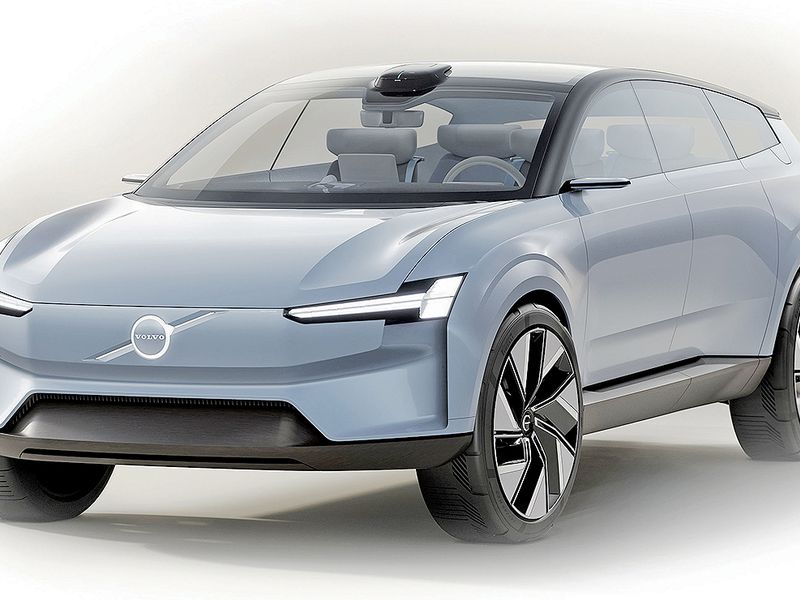
Volvo Cars isn’t waffling in its embrace of a zero- emissions future. By 2030, the Swedish automaker plans to ditch combustion engines globally and go all-electric. Volvo also is debuting a new retail strategy for its battery-electric vehicles — selling them online only for a fixed, no-haggle price that will include service, roadside assistance and insurance costs.
“We are convinced the premium car market will be electric,” Volvo Cars CEO Hakan Samuelsson told Automotive News in June.
By going all-EV, “we believe that is going to secure a better business, a better profitability for us, because being a sustainable brand is making us more premium,” Samuelsson said.
Volvo launched its EV offensive last year with the debut of a battery-powered version of its XC40 compact crossover. As of this July, the brand’s electrified Recharge models represented 20 percent of its U.S. sales.
EV sales are likely to go still higher with the arrival of a battery-powered flagship crossover similar to the XC90. That new vehicle will be revealed next year, with production expected to begin at Volvo’s assembly plant in Ridgeville, S.C., by early 2023.
Elsewhere in the lineup, the automaker will trim its V60 and V90 long-roof lineups next year as a result of the market’s waning enthusiasm for wagons.
S60: Volvo’s entry-level sedan will see a freshen in the second half of 2022 and receive a mild-hybrid powertrain as standard equipment.
V60: Starting next year, Volvo will abandon the gasoline version of its standard compact wagon.
Volvo will continue to offer the higher-riding V60 Cross Country variant, which is available with a 2.0-liter turbo-four that delivers 250 hp and 258 pound-feet of torque. Also available is a plug-in hybrid variant that combines a supercharged and turbocharged gasoline engine with an electric motor, for a combined 415 hp.
S90: The flagship sedan was freshened last summer, receiving updates to the front and rear fascia and additional safety features as standard equipment. A redesign is expected in 2023.
V90: As with the V60, Volvo will offer only the raised V90 Cross Country large wagon starting next year. That model features a 2.0-liter turbo-four that pumps out 316 hp and 295 pound-feet of torque.
C40 Recharge: The battery-powered C40 Recharge, which arrives in the first half of 2022, is a sporty version of the Volvo XC40. The C40 is Volvo’s second electric vehicle but the first to be available only as an EV. The dual-motor EV is developed on Volvo’s Compact Modular Architecture platform and is powered by a 78-kilowatt-hour battery that delivers 210 miles on a full charge. The battery can be fast-charged to 80 percent in about 40 minutes, Volvo said.
The C40 Recharge is the first Volvo designed without a conventional grille and introduces a new front fascia design that includes headlights with pixel technology.
XC40: Volvo’s brisk-selling compact crossover is expected to receive a freshen in the second half of 2022. An all-electric variant, the XC40 Recharge P8, debuted last fall. The BEV delivers 402 hp and an EPA-estimated 208 miles of range. It debuted an Android-powered infotainment system.
XC60: The midsize crossover was redesigned for the 2018 model, and a T8 plug-in hybrid variant was introduced. A freshen is due in the second half of this year that will feature a 48-volt mild-hybrid powertrain. It also will include Google’s new Android Automotive infotainment system.
Electric crossover: Next year, Volvo will reveal a large electric crossover similar to the XC90, the brand’s top-of-the-line model. Production of the unnamed EV is expected to begin at Volvo’s South Carolina factory by early 2023.
The vehicle, which will be built on an all-new EV platform, will include advanced safety and automated- driving technologies. The front fascia is anchored by a closed grille and new headlight design that retains Volvo’s signature “Thor’s Hammer” design but sports a new lighting feature that mimics an opening eye.
XC90: The large crossover was Volvo’s bestseller last year. But Volvo has confirmed there will not be a third-generation XC90 with a combustion engine or plug-in hybrid powertrain, though the brand indicated that the current generations of each may get updates.
XC100: The large new crossover will be built on Volvo’s next-generation platform and is expected to come in two configurations — a seven-seater and a six-seater with captain’s chairs.
The model is likely to be all-electric. Production should begin by early 2023 in South Carolina, with retail sales expected that year.

